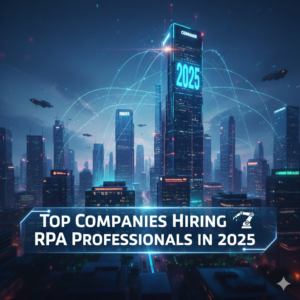How to Become an Artificial Intelligence Engineer
Anyone who is an aspiring tech professional today will likely have one question on their mind: How to become an AI engineer? Artificial intelligence is changing the way we work across multiple industries, whether it’s healthcare, finance, transportation, or entertainment. As companies continue to invest in automation and intelligent technology, the demand for proficient AI engineers is on the rise.
If you are interested in beginning your journey in this exciting field, you should understand the career path, the skills you need to build, the best places to learn the skills you need, as well as what job requirements typically entail.
Who is an AI Engineer?

An AI Engineer is a professional who is responsible for designing, programming, and training the extensive networks of algorithms that constitute an AI. They develop AI models that can learn from big data sets and then use this insight to predict or make decisions. By connecting the theoretical world of data science with the practical implementation of AI, AI engineers help bridge the gap between these two sides of data science.
Skills Required for an Artificial Intelligence Engineer
To become a proficient AI engineer, you need to become proficient in a wide variety of skills:
Technical Skills
- ●Programming Skills: Coding expertise in languages such as Python, Java, R, or C++ is imperative. In recent years, Python has been considered the dominant language for AI development due to the great number of libraries and frameworks available.
- ●Mathematics and Statistics: Familiarity with linear algebra, calculus, probability, and statistics is critical to understanding AI algorithms.
- ●Machine Learning Algorithms: Understanding different types of ML algorithms, including supervised, unsupervised, and reinforcement learning algorithms, is crucial.
- ●Deep Learning: Knowledge of neural networks and the ability to use deep learning frameworks such as TensorFlow, PyTorch, or Keras is gaining importance.
- ●Data Modelling and Evaluation: Along with the skills needed to preprocess the data, feature engineering and model evaluation techniques are critical expertise needed to develop quality AI systems.
- ●Cloud Services: This could include cloud-based platforms such as AWS, Google Cloud, or Azure that have AI and ML services for a variety of functionalities.
Soft Skills
- ●Problem Solving: The ability to analyze complex problems and develop solutions with a pragmatic and creative approach.
- ●Communication: The ability to communicate technical details to stakeholders who may not be technical.
- ●Continuous Learning: AI is a rapidly evolving field, with new learning occurring each week or month, requiring continuous education.
- ●Ethical Thinking: The ability to understand the ethical implications of AI systems and design solutions that consider those implications, as well as the responsibility of the designer.
- ●Teamwork: The ability to work effectively with data scientists, software engineers, product managers, and domain experts.
AI Engineer Career Path
The path to full-fledged AI engineer has many stages:
1. Educational Foundation: Most AI engineers have an educational background based on computer science, mathematics, or a related discipline.
2. Skill Development: This stage will include building knowledge in programming, statistics, and machine learning basics.
3. Specialization: After developing expertise in these three fundamental areas, the individual will move to a specialized area of AI, which could include natural language processing (NLP), computer vision (CV), reinforcement learning (RL), etc.
4. Entry-level positions: The next step typically includes entry-level positions like being a junior developer, data analyst, or machine learning engineer.
5. Advanced positions: Experienced AI engineers can move into advanced roles such as senior AI engineer, AI architect, or AI research scientist.
6. Management roles: Eventually, AI engineers may move to a management role, such as an AI team lead or Director of AI, or even Chief AI Officer.
The professional trajectory is not always linear and often looks unique based on the engineers’ interests, strengths, and opportunities at the time.
Also Read: How to Use AI in Your Job Search
AI Engineering Courses for Beginners

As a beginner in AI, I want to highlight the primary learning pathways outlined in bullet points below:
1. Formal Education
- ●Bachelor’s Degree: formal 4-year degree in Computer Science, Mathematics, Statistics or Engineering, so you have a strong foundation.
- ●Master’s Degree: a formal 1 2 – to 2-year degree program, which can be a specialized program in AI, Machine Learning, or Data Science, that develops advanced skills.
- ●Ph.D. Program: to be involved in research or academic AI projects.
2. Online Courses and Certificates
Massive Open Online Courses (MOOCs):
- ●Andrew Ng’s Machine Learning (Coursera).
- ●Deep Learning Specialization.
- ●Fast.ai’s Practical Deep Learning for Coders.
Professional Certifications:
- ●AWS Certified Machine Learning Specialty.
- ●Google Professional Machine Learning Engineer.
- ●Microsoft Certified: Azure AI Engineer Associate.
- ●IBM AI Engineering Professional Certificate.
Artificial Intelligence Job Requirements
AI roles demand a solid foundation in programming, mathematics, and data handling, paired with hands-on experience in machine learning and AI model deployment. Possessing the skills required for artificial intelligence engineer positions ensures you can meet real-world industry challenges effectively.
1. A solid background in computer science, mathematics, and data management, ideally with a degree in Computer Science, Data Science, or other related fields.
2. Exposure to Python, R, or Java, and be able to implement machine learning and AI algorithms and models.
3. Understanding of machine learning, neural networks, and natural language processing (NLP), and experience with AI frameworks, such as TensorFlow and PyTorch.
4. Essential skills for artificial intelligence engineer jobs include problem-solving, analytical thinking, cloud platform experience (AWS, Azure, Google Cloud), and familiarity with big data tools such as Hadoop or Spark.
5. Practical experience developing, training, deploying, and optimizing models, and associated projects or portfolios to illustrate readiness to work in real-world applications.
6. Demonstrated ability to work collaboratively with other team members, communicate clearly, and have a strong commitment to lifelong learning to keep pace with changing AI technologies.
Building Your Path to Becoming an AI Engineer
If you are someone who doesn’t have much experience, starting with AI engineering courses for beginners is one of the best ways to get a strong foundation. These beginner courses typically provide coverage of machine learning algorithms, data preprocessing methods, and model evaluation strategies, as well as include examples of hands-on projects to help you start applying your knowledge.
In addition to beginner courses, developing your projects, contributing to open source AI repositories, and completing internships will greatly enhance your profile. To validate your theoretical and practicum area credentials.
The Future of AI Engineering
With various industries exploring automation, predictive analytics, and generative AI solutions, the demand for AI professionals will grow in leaps and bounds. Many companies are already seeking people who fit the traditional description of artificial intelligence jobs in terms of skills such as deep learning, edge AI, and AI ethics.
New AI engineers will eventually see their skills being used in industries such as health management, finance, retail, manufacturing, and technology. You will need to keep your skills current while working in the field, due to the rapidly evolving tools and frameworks.
Conclusion
If you’re interested in becoming an AI engineer, you’ll need a blend of technical expertise, practical experience, and relevant education. Equipped with the knowledge of the skills needed to qualify for artificial intelligence engineer jobs, enrolling in beginner AI engineering courses, and keeping up with future trends in AI will put you on a path to a rewarding and meaningful career.
Ready to kickstart your AI career? Master the essential skills, gain hands-on experience, and explore endless opportunities in the AI field. For career guidance and placement support, connect with a trusted artificial intelligence recruitment agency like Time Agency Group today.
FAQs on Becoming an Artificial Intelligence Engineer
Q1. What is the first step to becoming an AI engineer?
The first step is to start with strong computer science, programming, and mathematics fundamentals.
Q2. Do I need a degree to be an AI engineer?
For someone without prior experience, a degree in Computer Science, Data Science, or a similar subject is highly encouraged.
Q3. What languages are required to develop AI?
You should learn Python, as well as R, Java, or possibly C++, for broader uses.
Q4. What are the key skills needed for an AI Engineering role?
Machine learning, data analysis, troubleshooting, and understanding an AI framework like TensorFlow or PyTorch.
Q5. Are certifications useful for AI jobs?
Yes, entry-level AI engineering courses or certifications in machine learning or deep learning help you get a job.
Q6. Do you need hands-on experience to get hired?
You’ll want to be building projects, doing internships, or deploying models.
Q7. What industries hire AI engineers?
The top industries are: Technology, healthcare, finance, ecommerce, manufacturing, and automotive.
Q8. How to continue advancing in my AI career?
Keep up with the latest tools in the field of AI, take classes/workshops, and keep learning.
Related Article: How To Learn Artificial Intelligence






